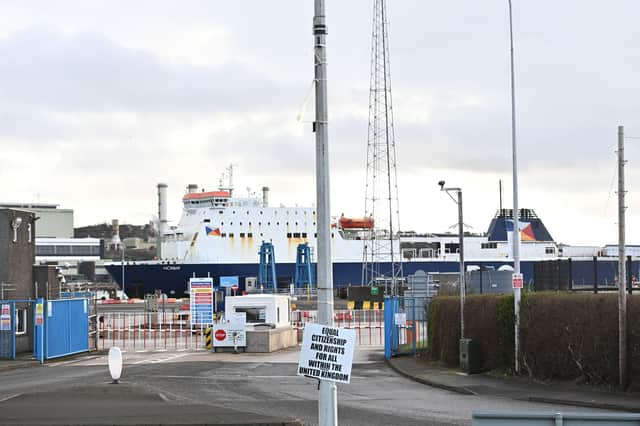Owen Polley: As a society, we're collectively looking the other way as the extent of the Irish sea border becomes clear


For that reason, debate on the sea border has gone quiet lately, apart from an article in the Daily Telegraph, reporting supermarkets’ concerns about the arrangements. Unfortunately, this relative silence belies the fact that the government continues to introduce regulations that will soon affect our lives deeply.
Many politicians and commentators, including some unionists, are reluctant to discuss these developments, in case they are portrayed as hard-line as a consequence.
Advertisement
Hide AdAdvertisement
Hide AdThe framework has been presented unrelentingly as a benefit to Northern Ireland, so the political parties are tempted to look at opinion polls showing support for the arrangements, and assume there is little point in focussing on its flaws.
That is an enticing strategy, but important changes are being made that they and their voters will soon be unable to ignore.
Last week, this newspaper highlighted the lack of honesty that now surrounds discussions about the framework. An editorial raised, as an example, the way that the phrase ‘trade diversion’ has disappeared from the debate.
When a large number of companies start to buy goods or materials from a different market, either because there are new barriers to their previous suppliers or because old barriers disappear, it’s called ‘diversion of trade’. Most economists say that this phenomenon creates higher costs for businesses, and makes goods more expensive for consumers.
Advertisement
Hide AdAdvertisement
Hide AdThe EU always claimed openly that Northern Irish companies should stop buying products in Great Britain and switch their supply chains to Brussels’ single market. But the original protocol contained safeguards that were ostensibly supposed to prevent this. In particular, either side could trigger Article 16, which acted as an emergency brake on the sea border, if trade diversion was to occur.
Previously, the government argued that it would be justified in taking this step, though it drew back in the hope that it could find a negotiated solution.
Last week, the Republic’s Economic and Social Research Institute (ESRI), published an analysis of cross border trade that suggested plainly that ‘trade diversion’ is taking place. This interpretation of its paper was barely discussed in the coverage by the BBC and other outlets, and the government seems to have given up on trying to prevent the phenomenon.
On the contrary, Westminster is implementing a statutory instrument called The Postal Packets (Miscellaneous Amendments Regulations) 2023. This legislation, which will govern the rules for sending parcels between Great Britain and Northern Ireland, changes the existing law, so that people sending goods here from the rest of the UK will be treated as exporters.
Advertisement
Hide AdAdvertisement
Hide AdIt will insert the words ‘and GB-NI postal packets’ after mentions of ‘foreign postal packets’ in the original act. In other words, parcels moving from Great Britain to Northern Ireland will soon be regarded as if they were being sent to a foreign country. That means that senders will have to complete customs paperwork and, in some cases, pay duties, which they can claim back through a process involving paperwork and evidence.
Thanks to a ‘grace period’ for parcels, packages currently move into Northern Ireland relatively freely, but that will soon stop. Almost certainly, more companies will cease selling goods to our market and it’s not even clear that parcels from private individuals will be exempt.
Remember, we were told by Rishi Sunak that the Windsor Framework would improve the protocol and remove ‘any sense’ of an Irish Sea border.
Sources in the relevant industries tell me that they’re still struggling to get clear information from Westminster about the new framework arrangements, which will be in force by October. Their meetings with government departments are frustrating experiences, featuring ‘fancy diagrams, but no access to detail’, with civil servants avoiding answering difficult questions.
Advertisement
Hide AdAdvertisement
Hide AdThere is confusion about new labelling rules and whether individual items must be labelled or whether one label could suffice for a box or multipack.
There is still no definitive list of goods that are entitled to go through the so-called ‘green lane’, that imposes fewer customs formalities. It’s not clear, either, whether wholesalers can use this route. Many experts believe they can’t, and that will affect huge number of smaller retailers who buy their stock at wholesale outlets.
We already know that manufacturers will have to bring in almost all their materials for processing through the ‘red lane’, with all the extra formalities and costs that involves. The University of Ulster economist, Dr Esmond Birnie, estimated that this would amount to 75% of total manufacturing purchases. Now supermarkets like M&S say they may have to use the red lane, because the labelling requirements for the green lane are so costly.
The government cannot explain what will happen if products are turned back from the green lane and whether that could cause backed up lorries at ports. The departments aren’t even sure where physical checks will take place, though any delays could cause food and other perishable goods to spoil, thanks to modern ‘just in time’ supply chains.
Advertisement
Hide AdAdvertisement
Hide AdThe most shocking aspect of this situation may not be the confusion and sense of impending chaos, but the lack of discussion it is generating, both politically and in the media.
As at so many points of our so-called ‘peace process’, we’re supposed to pretend that none of this is happening. It’s extraordinary, but many people seem only too prepared to accept that collective delusion, or to fall back on the comforting nonsense that this was all inevitable because of Brexit.
See also